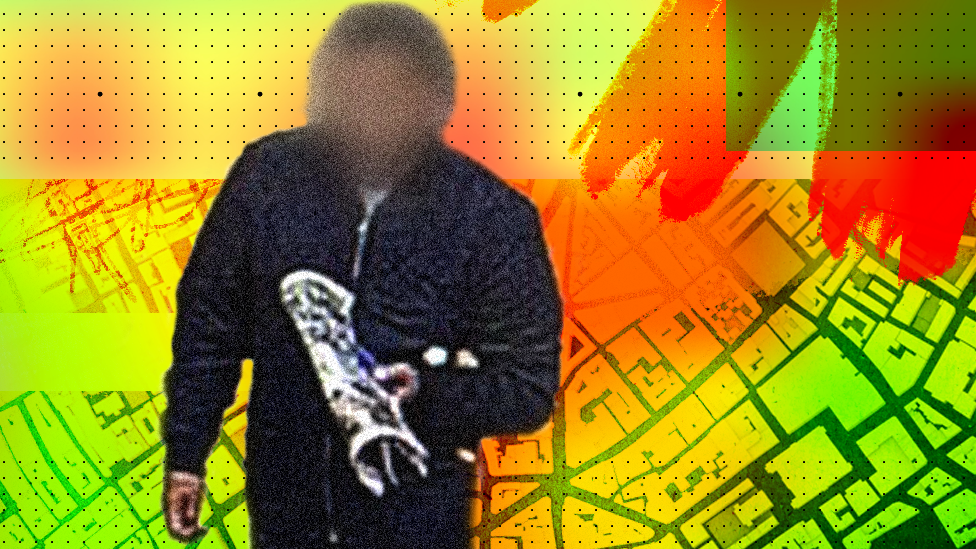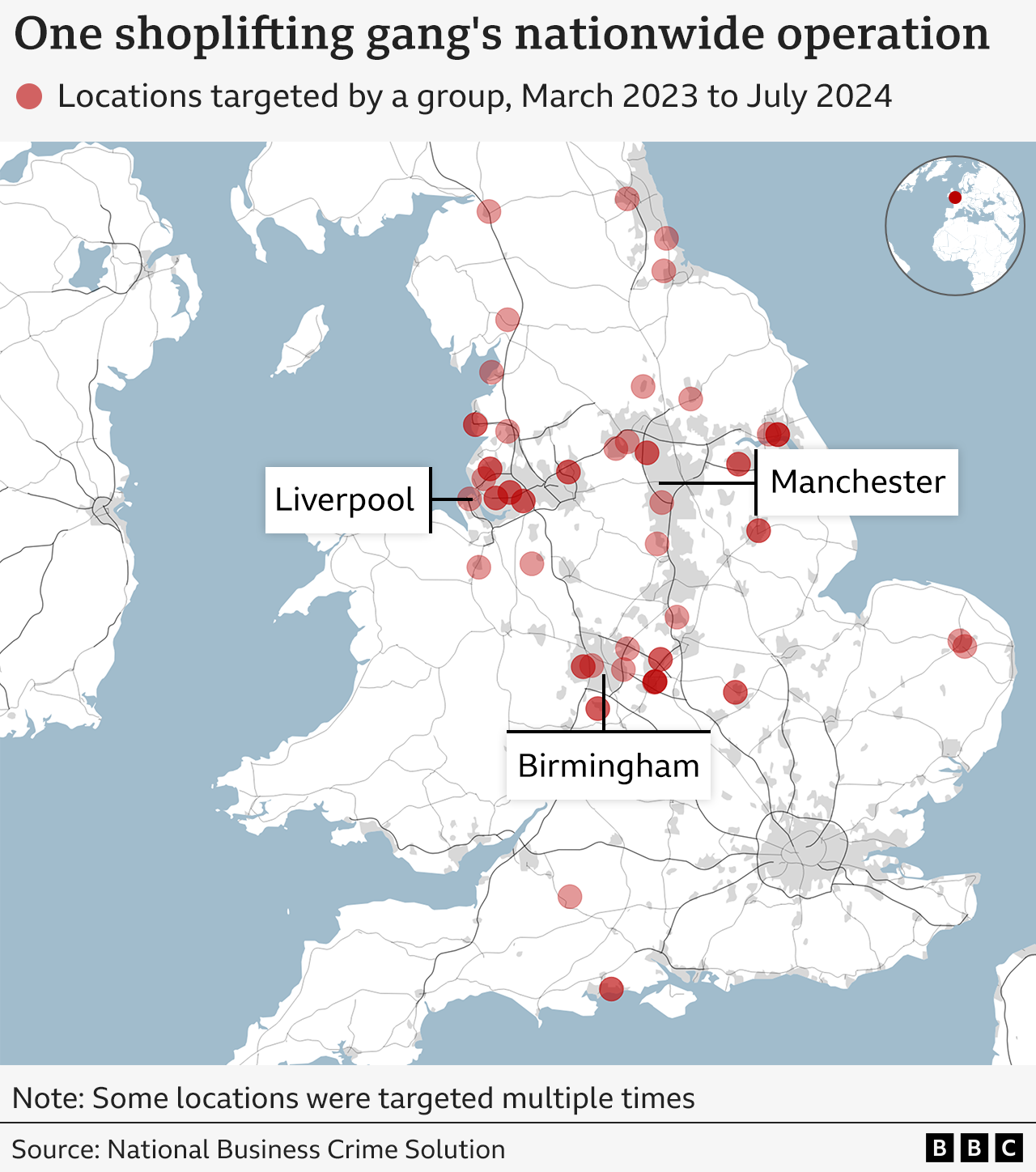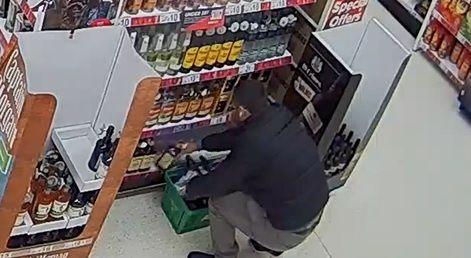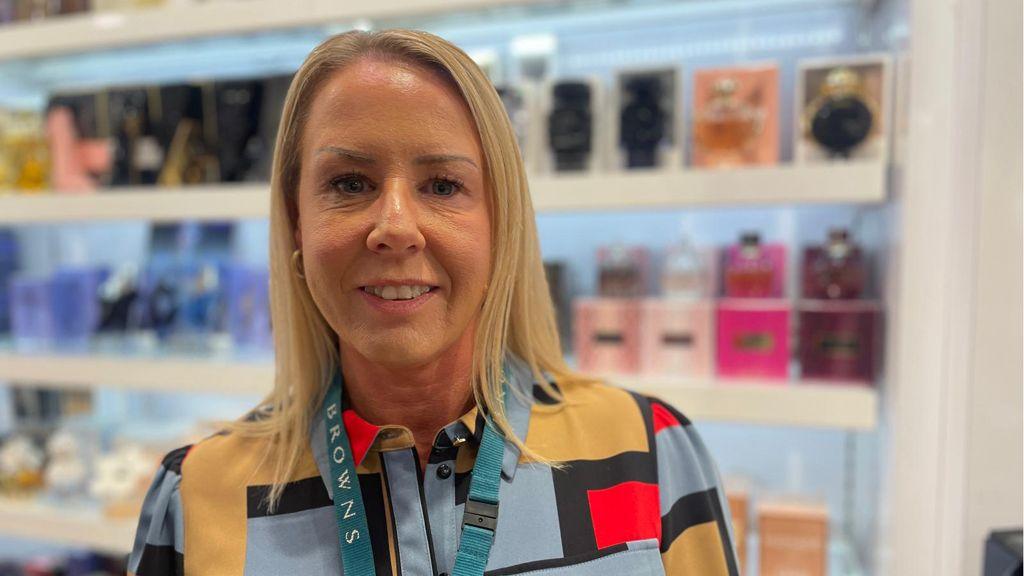Inside the £70k ‘mafia-style’ champagne shoplifting gang

- Published
The tactics of an increasingly professional shoplifting gang which has stolen at least £73,000 of goods from supermarkets across the UK have been revealed to the BBC.
Usually operating in groups of three, the gang members wear bluetooth headsets to communicate and warn each other if security guards are watching them.
Wheeling a trolley or carrying a supermarket basket, they blend in with shoppers as they walk down the alcohol aisle, casually taking champagne bottles off the shelves.
Then, one gang member will deliberately set off the security alarm to distract staff, while another simply walks out of the store with their stolen goods.
“It’s like a mafia-style operation. It’s run like a business,” says Sarah Bird from the National Business Crime Solution (NBCS) - an organisation which works with 100 businesses to tackle retail crime.

The criminals have been dubbed “the champagne gang” by the organisation, as it is the main item they have focused on stealing.
The gang “took full advantage” of a champagne shortage in mainland Europe 18 months ago, says Mrs Bird, caused by a post-Covid surge in demand and the failure of some crops. It meant a stronger black market, she says.
The group has a clear hierarchy with people at the top who instruct, she says, and a stream of employees who get paid.
“They travel to a specific place, they have a shopping list of things they need to steal. They steal the goods and get a day rate,” says Mrs Bird, head of local services at the NBCS.

Police believe the stolen goods are often transported into Europe
The sophisticated shoplifting operation carried out by the champagne gang is being replicated by other criminal groups across the country.
The NBCS says it is tracking 63 organised criminal groups across the UK who have stolen at least £2.4m of goods in five years. Of these, 26 groups originate from the UK and Ireland and the rest predominantly from Eastern European countries.
The champagne gang originates from Romania and is responsible for 60 shoplifting incidents across the UK - from Gateshead to Bournemouth - according to NBCS data.
They came onto the NBCS’s radar in early 2023, but have since started swiping other types of alcohol and meat to serve a new demand.
The group changes tactics when new technology comes into the market that might impact their operation.
“They were originally using trolleys to take goods out the stores,” says Mrs Bird. “However retailers invested in trolley wheel technology to stop the trolleys at certain points in the stores.
“So they’ve started to now use baskets and bags to remove the goods.”

Sarah Bird from the NBCS says only two members of the group have been prosecuted so far
While the gang typically operates in a group of three, during one theft in Harrogate, North Yorkshire, there were at least seven members in the shop.
“We believe they took the opportunity in the Harrogate store as a training day for the new recruits - showing them the ropes and then effectively putting them to work,” says Mrs Bird.
“If they’re caught, they’re disposable. Generally speaking if they’re arrested and charged they’ll be bailed and quite often they’ll move back to their country - in this case to Romania.”
Only two members of the group have been prosecuted so far, according to the NBCS.
It is not only the thieves who end up back in Romania - it is believed the stolen goods end up there too, she says.
Intelligence, including from ANPR cameras - Automatic Number Plate Recognition - suggests the gang’s vehicles drive to Europe with the goods inside.
“This acts as an effective supply chain. The goods are moved from the UK to the continent to be sold in the likes of Romania.”

Sarah Walker says the gangs entering her store are intimidating to staff
Retailers have repeatedly warned that shoplifting gangs are helping to fuel the rise in retail crime - and it is hitting shoppers in their pockets.
Shoplifting added £133 to the cost of an average UK household's annual shopping bill, according to the Centre for Retail Research.
Browns department store in Beverley, East Yorkshire, is being targeted by gangs who are getting smarter - its manager, Sarah Walker, says.
In March, one gang stole perfume from her store and within 90 minutes had targeted another Browns shop, 30 miles away in York.
“They’ve done research on the market where they’re going, they’ve looked at shops that have got the products that they need. It’s calculated,” Mrs Walker says.
Staff watch as gangs of four to six people of both sexes enter the shop, knowing exactly what to target.
“These gangs are intimidating, they can be young, and to put my staff under that vulnerability it’s hard,” says Mrs Walker.
“You don’t expect to come to work and be pushed and shoved out the way for someone who has got a shopping list - it’s organised crime and it’s a hit to our business.”
Mrs Walker says she reports shoplifting incidents to the police but it often “falls on deaf ears” and no-one gets arrested.
She wants to see more information sharing between UK police forces.

Steph Coombes, head of intelligence for the NPCC's Opal unit, says the initiative to tackle shoplifting has had positive results
Humberside Police said it had liaised with North Yorkshire Police and the forces believed the two incidents in Beverley and York were linked.
However, it said the suspects could not be identified from CCTV footage and therefore no arrests could be carried out.
The past year has seen more information sharing between forces, in the form of Project Pegasus, in the National Police Chief Council (NPCC), which is focused on serious organised shoplifting.
Shoplifting gangs are “very good at adapting” their methods, Steph Coombes, of the NPCC, tells the BBC.
A total of 60 arrests have been made under the operation in four months - impacting organised crime groups and individuals which account for £3.4m of loss, she added.
Get in touch
Have you been affected by the issues raised in this story?
Correction 4 November: The article previously stated that the Project Pegasus loss figure was £3.4bn and has been amended to make clear the figure is £3.4m.